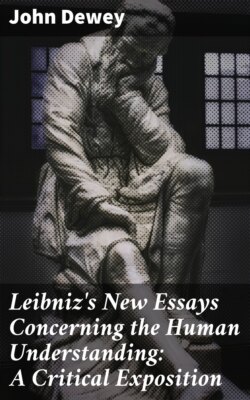Leibniz's New Essays Concerning the Human Understanding: A Critical Exposition

Реклама. ООО «ЛитРес», ИНН: 7719571260.
Оглавление
Джон Дьюи. Leibniz's New Essays Concerning the Human Understanding: A Critical Exposition
Leibniz's New Essays Concerning the Human Understanding: A Critical Exposition
Table of Contents
CHAPTER I. THE MAN
CHAPTER II. THE SOURCES OF HIS PHILOSOPHY
CHAPTER III. THE PROBLEM, AND ITS SOLUTION
CHAPTER IV. LOCKE AND LEIBNIZ.—INNATE IDEAS
CHAPTER V. SENSATION AND EXPERIENCE
CHAPTER VI. THE IMPULSES AND THE WILL
CHAPTER VII. MATTER AND ITS RELATION TO SPIRIT
CHAPTER VIII. MATERIAL PHENOMENA AND THEIR REALITY
CHAPTER IX. SOME FUNDAMENTAL CONCEPTIONS
CHAPTER X. THE NATURE AND EXTENT OF KNOWLEDGE
CHAPTER XI. THE THEOLOGY OF LEIBNIZ
CHAPTER XII. CRITICISM AND CONCLUSION
Отрывок из книги
John Dewey
Published by Good Press, 2019
.....
While there is always a temptation to force the facts which we know of a man’s early life, so as to make them seem to account for what appears in mature years, and to find symbolisms and analogies which do not exist, we are not going astray, I think, if we see foreshadowed in this early education of Leibniz the two leading traits of his later thought—universality and individuality. The range of Leibniz’s investigations already marks him as one who will be content with no fundamental principle which does not mirror the universe. The freedom with which he carried them on is testimony to the fact that even at this age the idea of self-development, of individual growth from within, was working upon him. In the fact, also, that he was self-taught we find doubtless the reason that he alone of the thinkers of this period did not have to retrace his steps, to take a hostile attitude towards the ideas into which he was educated, and to start anew upon a foundation then first built. The development of the thought of Leibniz is so gradual, continuous, and constant that it may serve as a model of the law by which the “monad” acts. Is not his early acquaintance with ancient literature and mediæval philosophy the reason that he could afterwards write that his philosophical system “connects Plato with Democritus, Aristotle with Descartes, the Scholastics with the moderns, theology and morals with reason”? And who can fail to see in the impartiality, the comprehensiveness, of his self-education the prophecy of the time when he can write of his ideas that “there are united in them, as in a centre of perspective, the ideas of the Sceptics in attributing to sensible things only a slight degree of reality; of the Pythagoreans and Platonists, who reduce all to harmonies, numbers, and ideas; of Parmenides and Plotinus, with their One and All; of the Stoics, with their notion of necessity, compatible with the spontaneity of other schools; of the vital philosophy of the Cabalists, who find feeling everywhere; of the forms and entelechies of Aristotle and the Schoolmen, united with the mechanical explanation of phenomena according to Democritus and the moderns”?
But we must hurry along over the succeeding years of his life. In the university the study of law was his principal occupation, as he had decided to follow in the footsteps of his father. It cannot be said that the character of the instruction or of the instructors at Leipzig was such as to give much nutriment or stimulus to a mind like that of Leibniz. He became acquainted there, however, with the Italian philosophy of the sixteenth century—a philosophy which, as formulated by Cardanus and Campanella, formed the transition from Scholastic philosophy to the “mechanical” mode of viewing the universe. He had here also his first introduction to Descartes. The consequences of the new vision opened to Leibniz must be told in his own words: “I was but a child when I came to know Aristotle; even the Scholastics did not frighten me; and I in no way regret this now. Plato and Plotinus gave me much delight, not to speak of other philosophers of antiquity. Then I fell in with the writings of modern philosophy, and I recall the time when, a boy of fifteen years, I went walking in a little wood near Leipzig, the Rosenthal, in order to consider whether I should hold to the doctrine of substantial forms. Finally the mechanical theory conquered, and thus I was led to the study of the mathematical sciences.”
.....